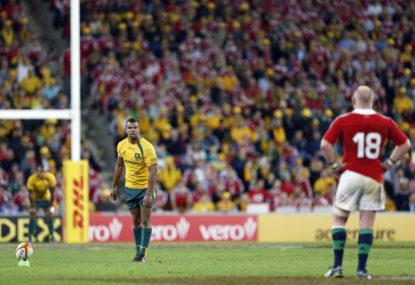If the Wallabies lose this series to the British and Irish Lions, it will be a national tragedy of epic proportions Australians will have to shoulder for 12 long years.
The ribbing from South Africans, Kiwis, and particularly the Poms would be unbearable. Were it to eventuate, however, there may be a silver lining.
No team has ever beaten the British and Irish Lions and gone on to win the Rugby World Cup two years later. The closest anybody has come to doing so was in 1987, when the All Blacks added the Wlliam Webb Ellis silverware to their trophy cabinet having annihilated the Lions four years previously.
But considering the World Cup is a recent invention, it is interesting to note the opposite has also held true.
In 1991, the Wallabies triumphed in the second Rugby World Cup, beating England in the final 12-6. It was an extraordinary chapter in history for the Wallabies, given the fact Nick Farr-Jones’ men had been beaten by the Lions just two years previously.
It was a journey in redemption for the Wallabies, who left a trail of destruction of their Lions’ antagonists by beating three of the British and Irish national teams on their way to the top; including England in the final at Twickenham in London, the very heart of the British Lions’ empire.
Notable dissimilarities of the present and past Wallabies teams notwithstanding, I believe we have here a precedent in history.
Should the Wallabies lose this series to the British and Irish Lions, the resulting shake-up – regardless of whether this involves the replacement of the head coach or not – will be profound. It could lift the Wallabies to win the next World Cup, whose hosting by England and Wales suddenly smacks of an apposite portension.
History bestows no guarantees, of course. It is merely a useful guide for those who understand its significance and know how to use it to direct their actions and motivate themselves.
If the Wallabies lose the series and fall into a stupor of self-pity and an inferiority complex, they will lose the next World Cup, and they will have nobody to blame but themselves.
By the same token they could yet win the Lions series and come out of it so convinced of their own brilliance they fail to redress their flaws and build on their strengths; much like the All Blacks of 2005 and the Springboks of 2009.
That’s another way to lose the next World Cup.
But to look their past failings in the eye and to take ownership for the consequences of future decisions and performances; to cut out the dead wood, to retain the prime, and to blood the talented; to settle an adventurous core of players around a workable gameplan that has purpose and a proven effect…
Aye. That’s a way to win a World Cup.
But it has to start right away. Perhaps it is too late to make ambitious changes to the Wallabies team for the remainder of the Lions’ series, but there will still be 11 Test matches left in the year to make the changes that will need to be made to bring experience to the deserving, and retirement to the redundant.
We all have our own views on whom we would like representing Australia in two years’ time, and while I could turn this article into a team-list haggle, that would miss the point.
And the point is that by the time the first match of the 2014 Rugby Championship rolls around, at least half our starting XV for the 2015 World Cup will need to be in the run-on side.
Again we have precedents in history. The All Blacks won in 2011 having retained seven of their starting XV from the first match of the previous year’s Tri-Nations. The Springboks did the same in 2007.
England in 2003 retained nine from their starting side against Scotland in their penultimate Six Nations tournament before the World Cup.
And, back in 1999, Australia retained 13 of their starting XV from the 1998 Tri-Nations opener.
For comparison, when Australia lost to Ireland in the pool stages in 2011, just four of the starting XV had been in the run on side for the previous year’s first Tri-Nations match.
Are you getting the picture? We cannot go into next year’s Rugby Championship without having worked out the composition of at least half our World Cup squad. We need to start building the core of our corps straight away.
Although I detest articles that involve ‘potential’ team lists for being overly academic and divorced from the exigencies of chance and reality, I will conclude this article by giving you the squad I think we need to build toward for the 2015 World Cup.
You can make your own inferences from this list of the kind of changes that I think need to be made, regardless of whether we beat the Lions or not.
Discuss.
MATCH DAY XXIII
1. James Slipper (Reserve: Scott Sio)
2. Stephen Moore (Tatafu Polota-Nau)
3. Dan Palmer (Paddy Ryan)
4. Hugh Pyle (Kane Douglas)
5. James Horwill ©
6. Ben Mowen
7. David Pocock (Liam Gill)
8. Scott Higginbotham
9. Will Genia (Nic White)
10. Matt Toomua
11. Digby Ioane
12. Christian Lealiifano (Ben Tapuai)
13. Tevita Kuridrani
14. Henry Speight
15. Israel Folau (Jesse Mogg)
Remainder of squad:
Benn Robinson, Sekope Kepu, James Hanson, Rob Simmons, Scott Fardy, Ed Quirk, Michael Hooper, Jake Schatz, Nic Phipps, Bernard Foley, Joe Tomane, Kyle Godwin, Mitch Inman, James O’Connor, Kurtley Beale





























































































